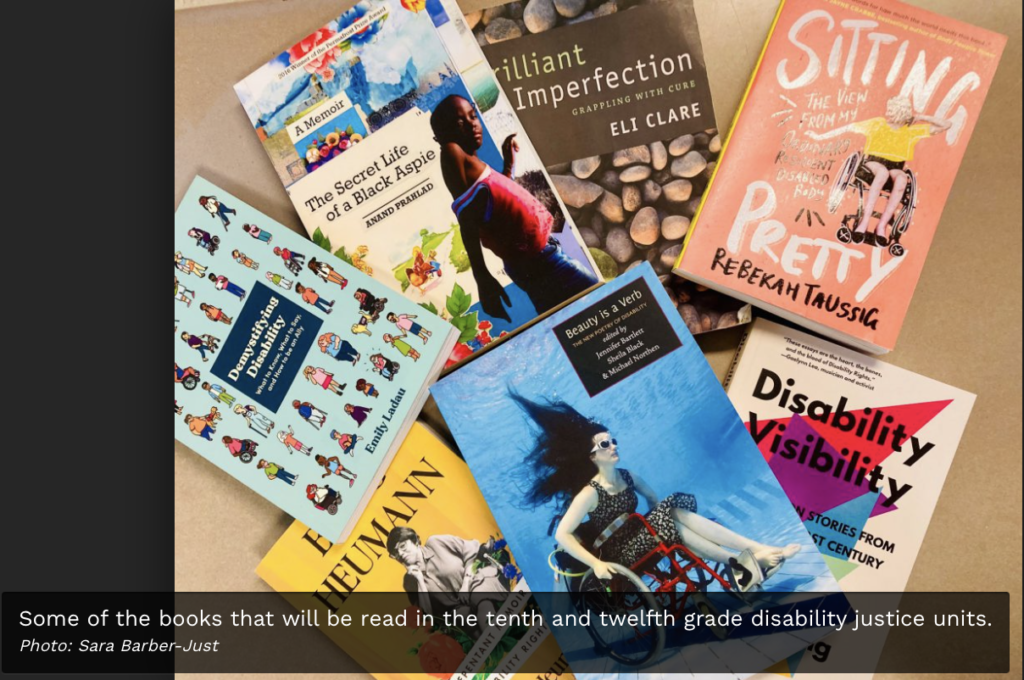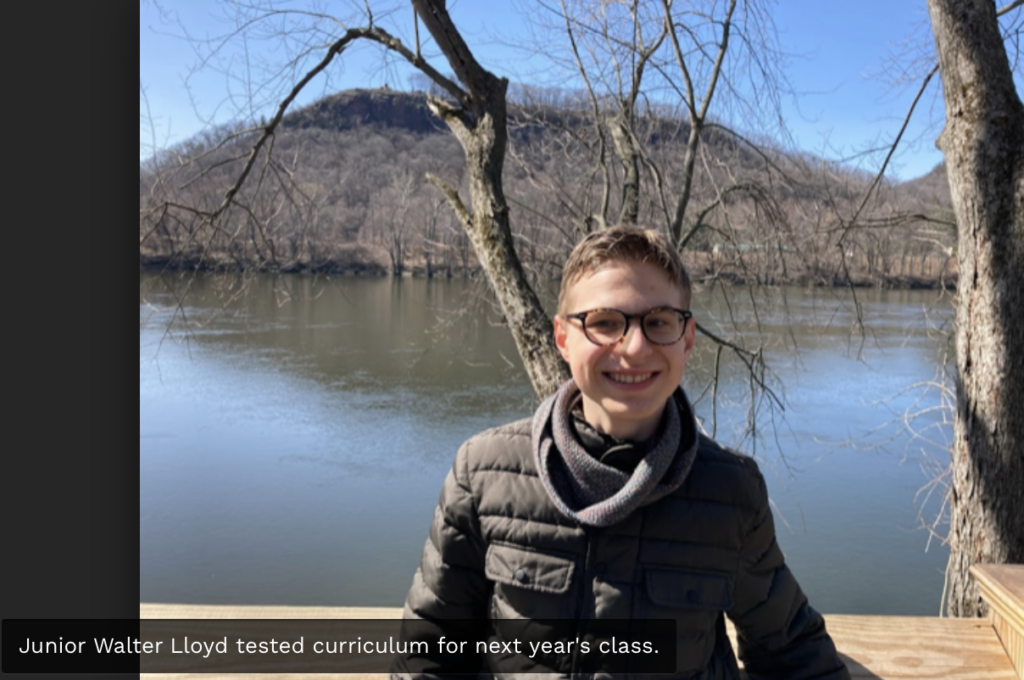ARHS Will Introduce Disability Justice Course This Fall

This article appeared previously in The Graphic.
Next fall, Amherst Regional High School (ARHS) will feature a new quarter-long English course on disability justice, created by English teacher and department head Sara Barber-Just and tested out in an 18 week Alternative Learning Plan of Study (ALPS) with 11th grade student Walter Lloyd. The course will feature the work of disabled creators and examine key moments in disability history in the United States – with special attention paid to the contributions and experiences of disabled people who are also BIPOC, queer, women, and immigrants.
In Lloyd’s tenth grade English class, he first had access to curriculum about disability when Barber-Just included a number of disabled poets in a choice-based poetry project. Lloyd chose “I Am Too Pretty for Some Ugly Laws,” by Lateef McCleod, and ended up writing a letter to the poet about his experiences. McCleod wrote back and encouraged Lloyd to continue to advocate for disability justice in his community.

During conversations with Barber-Just during this unit, Lloyd talked about how important it was to see himself reflected in the curriculum. Lloyd, who has cerebral palsy, has been active in disability education since middle school.
He gave a speech about disability to his entire middle school, and also published an opinion piece in the Daily Hampshire Gazette about accessibility problems on the UMass campus. He also currently participates in the Alliance Against Ableism at UMass. During the course of the ALPS, Lloyd also spoke at a seminar on disability with the Boltwood Project at UMass. When Barber-Just proposed developing a whole course on the subject and asked Lloyd if he’d be willing to explore the materials in an ALPs with her, he responded, “absolutely.”
Lloyd engaged with all of the disability justice literature proposed for the course and through his dedication to creating an inclusive course, the syllabus was created. His favorite aspect of working on the project was how eye-opening it was.
“It was very interesting to see all different perspectives, because I didn’t have a lot of disability perspectives, even as a disabled individual,” he said. “I only have a physical disability.” He enjoyed learning about “how people feel around the language around disability.”
Even before this course was developed, Barber-Just had been dedicated to making the English Department an inclusive space for all students. In an article with Crip News, Barber-Just said, “I don’t think we could have jumped into any sort of disability justice curriculum without centering access. Once we created all of these ways to make our classrooms more accessible, I started including disabled voices in the general curriculum, starting in my sophomore poetry unit.”
Barber-Just said her goal for the course is for students to “be so immersed in these ideas that they internalize and live disability justice, that they go out into the world and consciously think about the needs that they and other people have and how to meet them.”
The senior quarter-long course will include texts such as: Disability Visibility, by Alice Wong, The Secret Life of a Black Aspie, by Anand Prahlad, and Sitting Pretty by Rebekah Taussing. Lloyd also wrote a long letter connecting his experience to Rebekah Taussig’s and the author wrote back.
At the moment, Barber-Just and other tenth grade teachers are also currently teaching Sitting Pretty in a new required disability history and literature unit for sophomores. When those sophomores are seniors, she will phase that text out of the senior course and replace it with another text. “I wanted to be sure that next year’s seniors, who missed this new sophomore unit would still have access to it,” she noted.
In addition to reading Sitting Pretty and Disability Visibility together and discussing the content, they also watched many films including the Academy Award-winning “CODA,” as well as “Audible,” “Becoming Helen Keller,” “Douglas,” “Code of the Freaks,” and “Far From the Tree.”
Barber-Just designed this course during her D and D+ prep periods, in addition to her regular teaching load. She felt she deeply connected with Lloyd over the course of the 18-week project. “I learned so much in the process from Walter,” said Barber-Just. “He’s so smart, funny, thoughtful, and passionate. We had a wonderful time!”
Both Barber-Just and Lloyd agreed that a disability justice course is long overdue. Barber-Just said in addition to hearing from Lloyd, it’s been really powerful to hear her sophomore students talking about disability in more critical, nuanced, and vulnerable ways.
“During the curricular testing period, I have seen them talking about the intersections of their race, their trans identity, and being autistic, dyslexic, chronically ill, and physically disabled in ways that I have never seen in my classroom,” she said. “It’s time to offer this curriculum to everyone.”
Em Grybko is a senior at Amherst Regional High School. Next year they will be studying at Mount Holyoke College as a prospective Critical Social Thought and Psychology double major.

Thanks to Sara Barber-Just for developing this important addition to the ARHS curriculum and to Walter Lloyd for piloting the course. I would also suggest using “Crip Camp: A Disability Revolution,” a 2020 documentary on the creation and passage of the ADA, available on Netflix–a truly remarkable film about remarkable people.